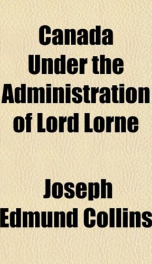canada under the administration of lord lorne

Purchase of this book includes free trial access to www.million-books.com where you can read more than a million books for free. This is an OCR edition with typos. Excerpt from book: s- ...fthe .ives as (.- was re- ..ortance to named lately vacancies by es occupied by .v officials had no :i Macdonald who , the clerk directing ule since the dissolu- . rly dismissed the late I'act at once wrote to the ice of the executive in a entirely to him, affirming .11 him by the late parliament In the meanwhile the clerk ling under the hallucination - Ljanized the department by pro-. : i distribution of duty. And now V' disclaimed any desire to raise . -. but believing his interpretation of Ms anxious to have a definite declar-. ,1m in reply agreed that the question ! .ut he denied emphatically that there - part of the crown to encroach on the - the privileges of the house of com-;the application ; for the rest they may admire the good king and his subjects as much as they choose. As there was a good deal of jubilation at this time concerning the possibility of Canada entering into a second-hand treaty with foreign countries, it may be as well to state that immediately after the accession of Sir John to office it was found necessary for Mr. Tilley to go to England, to make a loan for public works ; and he was accompanied by Sir Alexander T. Galt and lieutenant-colonel Hewitt Bernard. The two latter gentlemen were commissioned by the Canadian government to negotiate a commercial treaty between the Dominion and France, and the Spanish West Indies. Before the finance minister returned he induced the colonial secretary to bring about a correspondence between the commissioners and the French and Spanish governments. The chief aim of the negotiations was a remission of the duties imposed by France on the sale of Canadian-built ships in that country; the establishment of such rates of duty as would practically admit, on reasonable terms, of the introduction into Fr...
Info about the book
Author:
Series:
Unknown
ISBN:
1554782066
Rating:
4.5/5 (4)Your rating:
0/5
Languge:
English
Users who have this book
Users who want this book
What readers are saying
What do you think? Write your own comment on this book!
write a commentGenre
if you like canada under the administration of lord lorne try:
Do you want to read a book that interests you? It’s EASY!
Create an account and send a request for reading to other users on the Webpage of the book!


